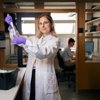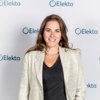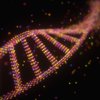Fritextsökning
Artiklar per år
Innehållstyper
-

An organ seldom in the spotlight – but utterly vital
The kidneys consist of more than 40 types of cells and have more functions in the body than most people know. Julie Williams leads AstraZeneca’s work in preclinical research about kidney diseases. “They are probably one of the most complicated organs in the body, and I like a challenge”, she says.
-

Cancer researcher: “We can do better and reduce suffering”
Lund University researcher Catharina Hagerling is developing innovative methods to understand metastatic cancer, aiming to create more targeted treatments for patients with disseminated cancer.
-

A new scientific event in Gothenburg
Life Science Sweden is holding an event in Gothenburg for the first time.
-

Ukraine war fuels rise of totally resistent bacteria
War-torn Ukraine is not just suffering from hostile attacks from a foreign aggressor, but also from the threat of a totally resistant and contagious bacteria.
-

Nobelpristagare spår första AI-läkemedlet redan nästa år
De första AI-utvecklade läkemedlen kan börja prövas redan mot slutet av året. Det säger Demis Hassabis, Googles chef för Deepmind och medgrundare till Isomorphic Labs.
-

Trender inom life science 2025 – Del 2 AI
Artificiell intelligens blir ännu bättre på att tolka data och mer multimodal. Risker med den nya tekniken diskuteras samtidigt allt mer. Del två i serien med trendspaningar inom life science 2025 handlar om AI.
-

Large study on milk: Risky for women but not for men
The risk of ischemic heart disease (IHD) and acute myocardial infarction (MI) increased for women with milk intake levels higher than 2 glasses per day, while no such association was found in men, according to a new large Swedish study.
-

Samuel Lagercrantz: ”Geoffrey Hintons farhågor”
”Ska vi få en så ljus framtid som möjligt där AI används på bästa sätt behövs både de som ser risker med den nya tekniken och de som ser sig som teknikoptimister”, skriver Samuel Lagercrantz i en ledare.
-

Tre forskare får Nobelpriset i kemi 2024
Årets Nobelpris i kemi går till David Baker, Demi Hassabis och John M. Jumper för att ha lyckats bygga nya proteiner och förutspå proteiners komplexa struktur.
-

Caroline Leksell Cooke ny chef på Elekta
Elekta har rekryterat Caroline Leksell Cooke till ny Senior Vice President och Head of Neuro Solutions. Hon börjar sin nya tjänst den 1 november.
-

Anna Törner: ”Mom, do you think you’ll ever get married again?”
”I realize I’m slowly descending into that familiar statistical rabbit hole, where life’s biggest uncertainties are reduced to point estimates and confidence intervals”, Anna Törner writes in a column.
-

Anna Törner: ”Mamma, tror du att du kommer att gifta om dig?”
”Jag inser att min hjärna är på väg ned i det statistiska kaninhålet, där frågor besvaras med punktskattningar och konfidensintervall.” Det skriver Anna Törner i en krönika.
-

EMA review confirms a risk of new cancer after CAR-T
CAR-T cancer therapies can, in rare cases, induce secondary cancers. The European Medicines Agency (EMA) now recognises this and requires a warning label to be attached to the product information and patients to be followed up for life.
-

Nobel Prize winner Torsten Wiesel turns 100: “Old men like me should use their experience to help the young”
In 1955, a young Torsten Wiesel jumped on a boat to the US and embarked on a fabulous career as a neuroscientist, crowned with a Nobel Prize for his work. Now 100 years old, he looks back on an intense life and his upbringing in Stockholm, Sweden, which shaped his desire to help the vulnerable in society.
-

“What is important is to create an overview and understanding from different perspectives”
Scientist Jochen Schwenk analyses blood proteins using proteomics to improve our understanding of disease and health. This year, he is moderating the Lab & Diagnostics of the Future event.
-

Failed to read the fine print – lost his life’s work
A celebrated CEO and co-founder of a pioneering lab company one moment – the next, fired, kicked out and written out of the company’s history. This is the story of a Swedish entrepreneur who was going to raise US venture capital to strengthen his company but lost his life’s work instead.
-

Chat GPT gav fel svar och hittade på referenser
Enligt en ny amerikansk studie kan Chat GPT vara farlig att vända sig till med medicinska frågor. Men att den hajpade chattboten hittar på egna fakta förvånar inte läkaren och AI-profilen Max Gordon.
-

Anna Törner: The clinical trial – Periscope to reality
What happens to the patients in the clinical trial is not very interesting, writes Anna Törner in a column.
-

Business Sweden: “Companies have a lot to offer in data-driven precision medicine”
Data-driven precision medicine can potentially solve major healthcare problems, states Business Sweden in a new report on the subject.
-

Founder of Bioarctic, Lars Lannfelt, is honoured: “I want to create something for the future”
It´s like a scientist’s dream: to be the world’s first with a drug that genuinely affects one of our major diseases. Lars Lannfelt and his company Bioarctic have achieved just that, and they are thus making a significant contribution to the history of Swedish medicine. He is now being awarded the Research!Sweden Award 2023.
-

High-tech companies are increasingly focusing on health
Tech companies have been taking an interest in healthcare for many years, and this interest seems to be increasing. “It’s not a sudden shift in trend, it’s more about them advancing their positions,” says Anna Lefevre Skjöldebrand, CEO of Swedish Medtech.
-

Högteknologiska bolag allt mer intresserade av hälsa
Under många år har techföretag intresserat sig för hälso- och sjukvården och det intresset ser ut att öka. ”Det är inget plötsligt trendbrott, det handlar mer om att de flyttar fram positionerna”, säger Anna Lefevre Skjöldebrand, vd för Swedish Medtech.
-

Studienamn med attityd – viktigare än man kan tro
Ironman, T-rex, Star-trec. Popcorn, Proper, Scout. Nej, det handlar varken om fantasyfilmer eller hundnamn. Utan om benämningar på pågående cancerstudier i Sverige.
-

New report: Fewer PhDs in life sciences
A new report from Vinnova suggests that competency returns in the life science sector are declining.